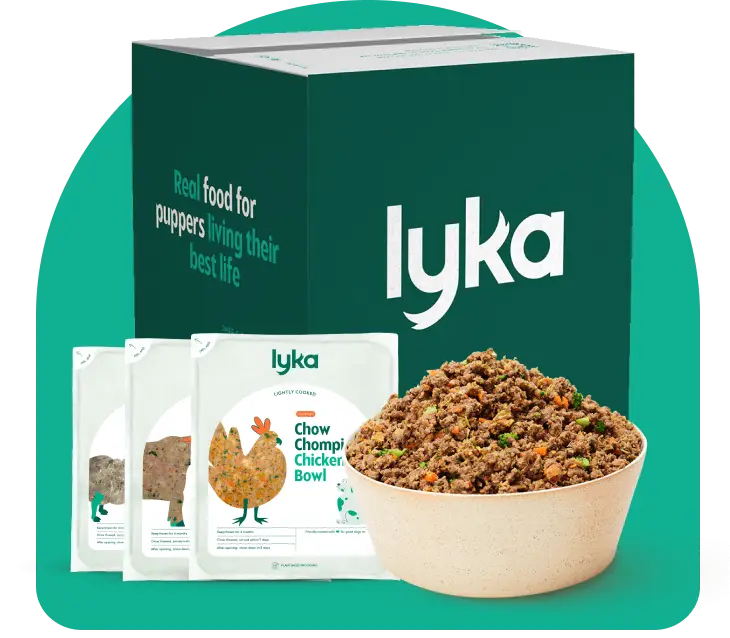Dog pancreatitis: a holistic guide to pain-free prevention and care

By Olivia Blazevic

Any illness your dog faces is concerning, but pancreatitis can be particularly tough on both pups and their parents — it’s hard to see your beloved pup in pain.
While it is a serious problem that requires veterinary care, a holistic approach to your pup’s health can help minimise future flare-ups or even prevent pancreatitis altogether.
Alongside regular vet check-ups, pancreatitis can be managed with a highly digestible, ultra-low fat diet, and regular age-appropriate exercise to maintain a healthy weight.
This in-depth guide has been written in collaboration with veterinary professionals to help you understand the disease, along with proven management solutions.
We give you the full pancreatitis picture, including:
What is pancreatitis?
What causes pancreatitis in dogs?
Pancreatitis diagnosis, treatment and secondary health issues
How a fresh food diet can help dogs with pancreatitis
How processed food aggravates pancreatitis
Lyka’s anti-inflammatory approach to nutrition
What is pancreatitis?

The pancreas is a v-shaped organ that lies underneath your dog’s stomach. It produces digestive enzymes that break down food particles, along with glucagon and insulin to regulate your pup’s blood sugar levels.
Inflammation in the pancreas can stimulate the early release of digestive enzymes that begin to break down the organ, almost as if it’s digesting itself. This can lead to tissue damage and other health complications, including diabetes.
There are two types of pancreatitis: acute and chronic. Acute pancreatitis is the sudden onset of the disease, and some cases can be without a known cause (idiopathic).
Chronic pancreatitis refers to ongoing problems or recurring acute flare-ups that can cause long-term damage to the organ.
The common signs of pancreatitis
The common signs of pancreatitis include:
When pancreatitis is severe, your dog’s abdomen will be very tense and painful, and they may yelp or wince when you touch them or pick them up.
You might notice your pup hunched up or in a ‘prayer’ position with the front of their body low against the floor with their rear end in the air. It might look like a play bow, but this indicates abdominal pain and severe discomfort.
In serious cases, the digestive enzymes can affect neighbouring organs, including the liver, triggering jaundice, which is identifiable by the yellowing of the skin, gums and sclera (the white parts of the eyes).
If you notice any of these symptoms, visit your vet straight away. Pancreatitis is a serious illness that can be life-threatening, so it’s important to address it early.
What causes pancreatitis in dogs?
Acute pancreatitis can be idiopathic, which means it can occur out of the blue — making it tricky to prevent. But many cases can be traced back to one or more of these triggers:
High-fat food
Dietary fat stimulates the pancreas to release digestive enzymes, but too much fat can put the pancreas under stress, leading to inflammation.
Pancreatitis can be triggered by an overabundance of saturated fat in a dog’s regular diet, or just one fatty meal. There’s often a significant increase in cases during holidays and festivals, like Christmas, when there are a lot of fatty leftovers, like ham.
Dietary indiscretions like eating scraps from the bin or discarded food at the park can also cause a bout of pancreatitis.
Obesity
Obese dogs are often more at risk of developing pancreatitis than those of a healthy weight. This is due to the higher levels of fat in their blood and abnormal metabolism, affected by changes in their hormone levels that can impact the function of the pancreas.
Injury or blunt trauma
Inflammation caused by injury or trauma to the pancreas can cause acute pancreatitis.
Toxins
Certain chemical toxins, like organophosphate insecticides, can hyperstimulate the cells in a dog’s pancreas, leading to pancreatitis.
Medication
Some chemotherapy, corticosteroid and antibiotic medications can lead to inflammation in the pancreas. If your dog is prone to chronic pancreatitis, your vet will be able to prescribe medication that won’t affect their sensitive organ.
Diabetes
The pancreas is not just responsible for the production of digestive enzymes. It also creates the hormones glucagon and insulin that regulate your pup’s blood sugar levels. If your dog experiences a hormonal imbalance that affects their metabolism, this can trigger pancreatitis.
Hypothyroidism
Like diabetes, hormonal imbalances in the body affecting metabolism, including the hormones produced by the thyroid, can cause inflammation in the pancreas.
Breed predisposition to pancreatitis
Some breeds are known to have higher levels of fat in their blood which can overstimulate the pancreas. Miniature Schnauzers, Miniature and Toy Poodles and Cocker Spaniels can be predisposed to pancreatitis.
Pancreatitis diagnosis, treatment and secondary health issues
When it comes to suspected pancreatitis, see your vet straight away so they can conduct the relevant tests to confirm a diagnosis and treatment plan.
Diagnosis
A blood test can help identify elevated levels of pancreatic enzymes, like amylase and lipase, which are released into the bloodstream at a higher level when the pancreas is inflamed or damaged. It may also reveal an increase in white blood cells, indicating an inflammatory response.
Your veterinarian may perform an x-ray or ultrasound imaging to visualise the pancreas and surrounding organs to assess for signs of inflammation or damage.
Treatment
If your pup is diagnosed with pancreatitis and has experienced vomiting and diarrhoea, it’s likely that they’ll receive supportive treatment, including IV fluids and electrolytes, to address their dehydration. They may also receive antiemetics to curb their nausea, which may have affected their appetite.
In severe cases, some dogs may require surgery to remove part of the damaged organ.
Once a dog has experienced a bout of acute pancreatitis, the organ becomes more sensitive to triggers like fatty food, which can lead to chronic pancreatitis. Dogs tend to be prescribed an ultra-low fat diet to help minimise this risk.
Prevention is always better than cure, especially when it comes to this disease. Carefully monitor what your dog eats through a balanced and complete diet that doesn’t contain high levels of saturated fat.
Secondary health problems triggered by pancreatitis
A sensitive, struggling or damaged pancreas can lead to other health problems, including liver disease, diabetes mellitus and exocrine pancreatic insufficiency (EPI):
Liver disease can be caused when inflammation from severe, acute pancreatitis spreads and damages liver cells, a condition known as hepatic dysfunction or hepatic injury. It can be identified by an elevation of liver enzymes in the blood.
Serious inflammation in the pancreas can also lead to the formation of pseudocysts, in some cases. These fluid-filled sacs can put pressure on nearby organs, including the liver, and cause further damage.
Diabetes mellitus (diabetes) is the body’s inability to regulate blood sugar levels effectively due to a deficient insulin production by the pancreas. In dogs, diabetes is a permanent condition that requires insulin injections, similar to humans with Type 1 diabetes.
Exocrine pancreatic insufficiency (EPI) is the pancreas’ inability to produce enough digestive enzymes to break down food particles for nutrient absorption, leading to malnourishment.
Both diabetes and EPI are significant illnesses requiring long-term treatment.
It’s important to mention that severe pancreatitis can weaken a dog’s immune system and increase the risk of developing infections like pneumonia, urinary tract infections (UTI) and bloodstream infections.
How a fresh food diet can help dogs with pancreatitis
Dogs with pancreatitis have a sensitive and inflamed pancreas that struggles to produce enzymes and hormones, affecting its ability to digest food effectively. A human-grade, fresh food diet containing bioavailable ingredients for easy digestion and nutrient absorption is ideal for all pups, especially those prone to pancreatitis.
Whether your dog’s diet is homemade or purchased, it should be complete and balanced and contain a range of these powerful ingredients:
Low-fat diets enriched with essential fatty acids (EFA)
Dogs need some fat in their diet as a source of energy and to help their body absorb nutrients. A diet that is high in saturated animal fat is not advisable for any dog, especially those with a sensitive pancreas.
But not all fats are the same.
A diet that contains the right balance of essential omega fatty acids from fish or fish oil can optimise their digestive functions and the absorption of vitamins and minerals. It’s also a natural anti-inflammatory ingredient.

The primary dietary concern, in cases of canine pancreatitis, is ensuring a low-fat diet. Restricting fat limits the hormones that can hyperstimulate the pancreas, triggering pancreatitis. Lyka’s meals are high in Omega-3 EFA, shown to decrease mortality, and reduce infectious complications and length of hospitalisation, in cases of acute pancreatitis.
Louise Hawkins, Vet Nurse and Research and Development Associate at Lyka
High-quality protein
In some cases, dogs with pancreatitis need to have restricted protein in their diet. Many kibble brands rely on plant proteins like legumes, that are hard to digest and cause digestive problems like trapped wind — not pleasant for a pup with a struggling digestive system.
Human-grade meat from grass-fed, free-range, barn-raised or wild-caught sources provide pups with high-quality protein without the risk of inflammation associated with grain-fed animals. These proteins also contain a higher amount of antioxidants and essential fatty acids, contributing to the overall health and wellbeing of your dog.
Anti-inflammatory ingredients
Natural anti-inflammatory ingredients including safflower oil, flaxseed oil, kelp and shiitake mushroom powder can reduce the development of inflammation in your pup’s body before it triggers pancreatitis.
Antioxidant ingredients
Free radicals cause oxidative stress causing tissue damage and inflammation. Choose a diet that contains natural antioxidants like raspberries, green cabbage and quinoa to combat oxidative stress and prevent inflammation.
Low-GI food
If your dog is prone to weight gain or needs to lose a few kilos, make sure their diet contains low GI carbohydrates, like pumpkin or purple sweet potato, so they feel fuller for longer. Managing your pup’s weight and preventing obesity is an effective way of minimising associated health problems, like pancreatitis.
Spikes in blood-sugar levels demand more work from the pancreas to release insulin. Low GI foods release their energy slowly without stressing the organ.
Naturally high water content
A healthy diet of fresh, lightly cooked food retains moisture and nutritional value and minimises the risk of pathogens associated with raw food. Keeping your pup hydrated reduces the stress on their digestive system.

Highly digestible foods are important for dogs with pancreatitis to reduce the workload on the pancreas and minimise flare-ups. Dogs with pancreatitis may benefit from a low-fat, moderate protein, highly digestible diet, including lean proteins such as chicken, turkey, and fish, and complex carbohydrates such as sweet potatoes and quinoa.
Dr. Darcy Marshall, Veterinarian and Account Manager at Lyka
How processed food aggravates pancreatitis
Processed dog food, like commercial kibble, usually contains a large proportion of common inflammatory ingredients including wheat, soy, dairy and corn. When these ingredients are part of your pup’s daily diet, the accumulative effect puts additional stress on their digestive system, including their pancreas.
Dry food is also cooked at extremely high temperatures to create a biscuity texture and support a long shelf-life. This comes at the expense of nutritional value. Brands often add artificial flavours, additives and preservatives as a result and rely on added palatants to make the food appetising.
The result is often likened to junk food — tasty but with little nutritional value and full of ingredients that irritate a struggling digestive system.
Lyka’s anti-inflammatory approach to nutrition
Lyka’s ultra-low-fat Kangaroo and low-fat Chicken recipes are ideal for pups with pancreatitis. Bursting with natural anti-inflammatory and antioxidant ingredients, each recipe is complete and balanced to provide the right amount of calories and nutrients to keep your pup in tip-top condition.
Each drool-worthy dish is lightly cooked so your pup can enjoy a healthy meal that’s pancreas-friendly and easy on their digestive system.
Even if your dog doesn’t have pancreatitis, our vet-formulated recipes provide delicious fresh food nutrition for powerful preventive healthcare.
This article was reviewed by Lyka’s animal care experts.
Reviewed by:
Louise Hawkins, Qualified Veterinary Nurse and Research and Development Associate






